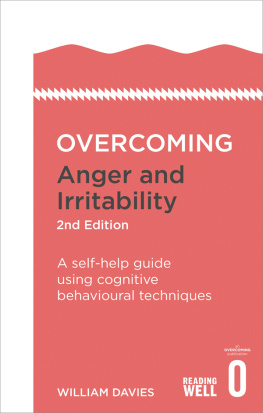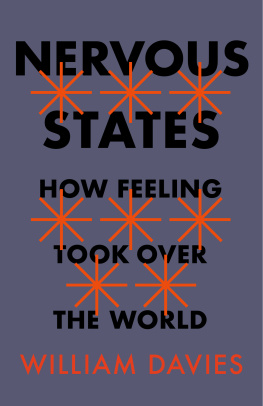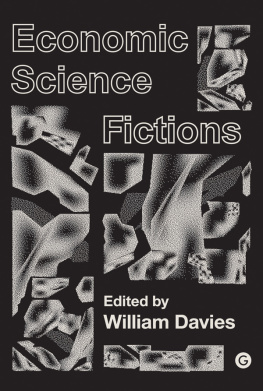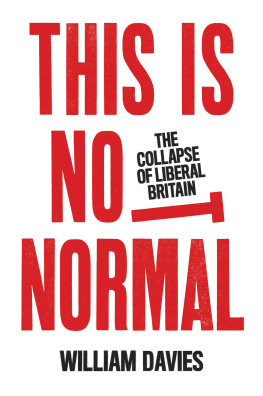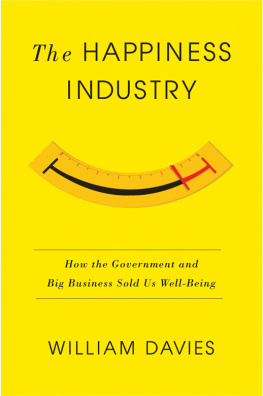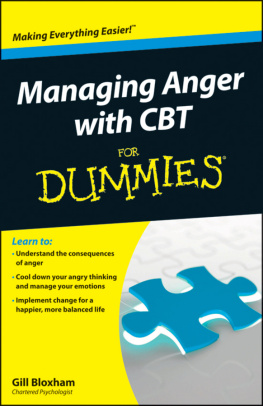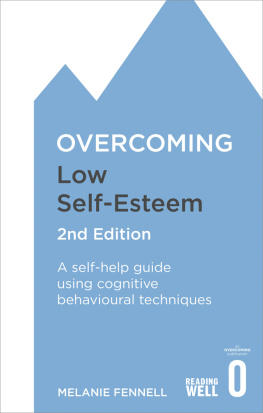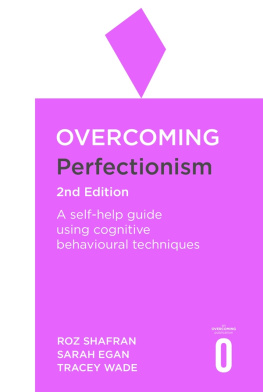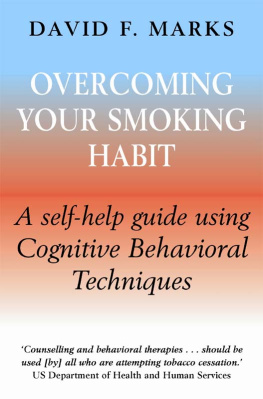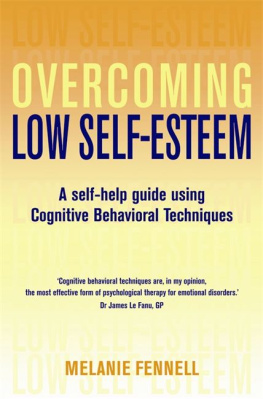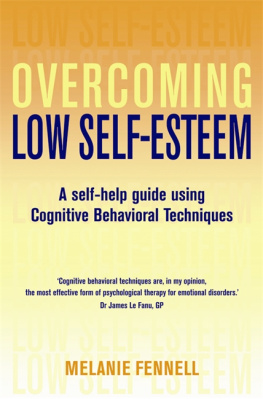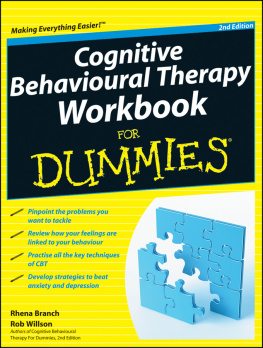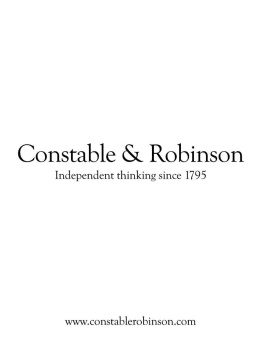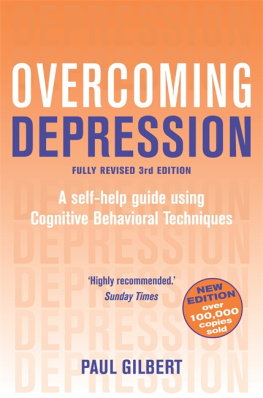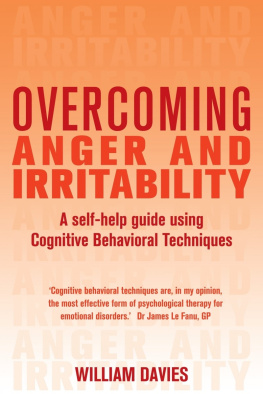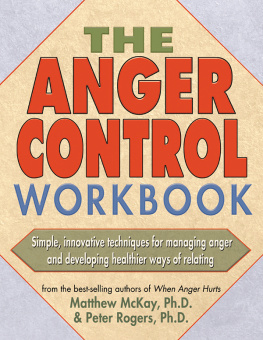OVERCOMING
ANGER AND IRRITABILITY
2nd Edition
A self-help guide using
Cognitive Behavioural Techniques

WILLIAM DAVIES

ROBINSON
First published in Great Britain in 2000 by Robinson,
an imprint of Constable & Robinson Ltd
This edition published in 2016 by Robinson
Copyright William Davies, 2016
The moral right of the author has been asserted.
All rights reserved.
No part of this publication may be reproduced, stored in a retrieval system, or transmitted, in any form, or by any means, without the prior permission in writing of the publisher, nor be otherwise circulated in any form of binding or cover other than that in which it is published and without a similar condition including this condition being imposed on the subsequent purchaser.
A CIP catalogue record for this book
is available from the British Library.
Important Note
This book is not intended as a substitute for medical advice or treatment. Any person with a condition requiring medical attention should consult a qualified medical practitioner or suitable therapist.
ISBN: 978-1-47212-046-5
Robinson
An imprint of
Little, Brown Book Group
Carmelite House
50 Victoria Embankment
London EC4Y 0DZ
An Hachette UK Company
www.hachette.co.uk
www.littlebrown.co.uk
To Philippa
Contents
PART ONE
Understanding What Happens
PART TWO
Sorting It Out
PART THREE
Putting Things Into Practice
More of a tribute than an acknowledgement. First to the great names in the therapies on which this book is based: especially B.F. Skinner, A.T. Beck, Albert Ellis, Christine Padesky, and Marsha Linehan. And to another great name, Neil Frude. I co-authored Preventing Face-to-Face Violence with Neil and I am forever indebted to his generosity in our joint work. He is responsible for the irritants, costs, transgressions concept, for much of the central spine of the model that I espouse in this book, and surely for much more. Not only that but he then went on to establish the concept of bibliotherapy and to promote the UKs Books on Prescription scheme, which I am proud to say has adopted this book into its ranks. Also to a great name in anger, Raymond Novaco, for his helpful and interesting observations on the first edition. And to my patients who have given so much of the case material I use, along with their often deliberately entertaining contributions to working on their problems it seems that people with these problems also have a remarkable sense of humour. And most of all to my wife Philippa who features in a disconcertingly large number of the anecdotes (Is it me who is irritable or you who is irritating?) and does so cheerfully and apparently without minding. Also for her reading of the book and the invaluable comments she makes in doing so. Finally to Andrew McAleer at Robinson, firstly for prompting this second edition and also for tolerating the ever-shifting deadlines certainly without anger and apparently without irritation. I am grateful to you all.
I hope youve enjoyed reading this book and, more to the point, I hope you have found it useful. I have certainly enjoyed writing it and confess to being pleased with the result. I think you have all the information here necessary to sort out your irritability or anger successfully and permanently.
Maybe, indeed, you have done so already, just in the course of your first reading. This is especially likely if you have chosen the projects carefully for yourself and implemented them thoroughly.
A word of caution and encouragement, however. Old habits die hard, and you may very well find that you have to reread parts of this book over months and even years to maintain your success. Indeed, I would urge you to do that, because the more pieces of the jigsaw you get in place, the easier it is to see a good clear picture. It may be that, when you first read through the book, you just cream off the most relevant bits for yourself. On rereading you might implement other bits that are relevant, but not quite so relevant as the first level. This is still well worth doing, however, because it makes the whole process clearer and easier. So, do reread, lots of times if you want, because the projects are good ones and will really sort things out for you if you follow them through.
And one final thought: You probably embarked on this book out of consideration for those around you and very commendable that is. Nevertheless, I hope you find that it has done wonders for your own enjoyment of life, too!
Diary 1
Keep a record of when you get irritable or angry. Fill it in as soon as possible after the event. Note as clearly as possible what triggered your irritability/anger, and how you responded.
Trigger ( include day, date and time )
Response ( what did you do? )
Diary 1
Fill in as soon as possible after the event.
Trigger ( include day, date and time )
Response ( what did you do ?)
Diary 1
Fill in as soon as possible after the event.
Trigger ( include day, date and time )
Response ( what did you do? )
Diary 1
Fill it in as soon as possible after the event.
Trigger ( include day, date and time )
Response ( what did you do? )
Diary 1
Fill it in as soon as possible after the event.
Trigger ( include day, date and time )
Response ( what did you do? )
Diary 2
Fill this in as soon as possible after each time you get irritable or angry.
Trigger : Describe here what a video camera would have seen or heard. Include the day and date, but do not put what you thought or how you reacted.
Appraisal/Judgement : Write here the thoughts that went through your mind, as clearly as you can remember them.
Anger : Leave this blank for the time being.
Inhibitions : Leave this blank for the time being.
Response : Write here what a video camera would have seen you do and heard you say, as clearly as you can.
More helpful appraisal/judgement : How else might you have appraised the situation? To determine this, you might like to consider the following: What errors are you making (selective perception, mind-reading, all or nothing thinking, emotive language, overgeneralisation)?
If you had an all-knowing, all-wise friend, how would s/he have seen the situation?
Is a reframing of the situation possible? (A glass that is half empty is also half full.)
What would your costbenefit analysis be of seeing the situation the way you did?
Diary 2
Fill this in as soon as possible after each time you get irritable or angry.
Trigger : Describe here what a video camera would have seen or heard. Include the day and date, but do not put what you thought or how you reacted.
Appraisal/Judgement : Write here the thoughts that went through your mind, as clearly as you can remember them.
Anger : Leave this blank for the time being.
Inhibitions : Leave this blank for the time being.
Response : Write here what a video camera would have seen you do and heard you say, as clearly as you can.

